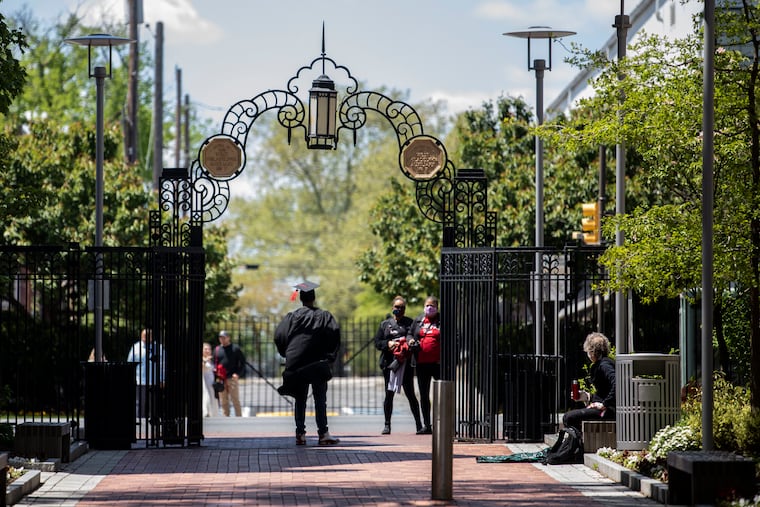Temple has said it will review 2017 offensive social media posts by Inquirer editor’s son
The cases at Temple are among a number of complaints being reviewed by colleges around the country, including Penn State and Stockton.

Temple University has said it will review several offensive social-media posts by current and incoming students, including one by the son of the editor of The Inquirer.
Gabe Escobar, 18, an incoming Temple student and son of Inquirer editor and vice president Gabriel Escobar, had used the N-word in one post and homophobic slurs in two others on Snapchat in 2017.
Last week, someone else highlighted those posts on Twitter, identified Escobar as an incoming Temple student, and listed the university’s admissions office phone number and email address.
“We’re aware of this content and the student associated,” Temple tweeted on Thursday. “We have sent this information to our dean of students for further review and investigation.”
The issue surfaced as The Inquirer was facing public criticism and internal turmoil over its treatment of journalists of color and an insensitive headline the paper ran last week. Escobar’s father was one of three editors who issued an apology for that headline, which had been written by another staffer and was seen as suggesting an equivalence between the loss of buildings and the lives of black Americans. Three days after that apology, Inquirer Executive Editor Stan Wischnowski announced his resignation.
The younger Escobar’s case is one of several that Temple has been looking into, university spokesperson Ray Betzner said Sunday.
Last week, Jimmy Freas, a media studies and production student, was removed from his role at Temple’s WHIP radio station after his social media post mocking the death of George Floyd at the hands of Minneapolis police and the subsequent national protests. Betzner declined to say how many other cases the university is reviewing.
In Freas’ case, the university initially tweeted: “Racist behavior, such as this, is disgusting and never acceptable” and said administrators are taking action. Subsequently, the university clarified in another tweet that Temple respects First Amendment rights, “including those that express unpopular and even hateful speech that is antithetical to the university’s mission.”
Freas could not be reached on Sunday. In a statement to the Temple News, he said: “I never meant to disrespect the memory of George Floyd, I was just unhappy with the outcomes of some of the riots.”
In recent years, colleges increasingly have been asked to deal with offensive social media posts by prospective or current students, while admissions counselors and educators have warned students they could be held accountable for such public statements. Floyd’s death and subsequent protests have yielded another round of complaints. Locally, Pennsylvania State University and Stockton University are dealing with similar cases, as are the University of South Carolina, Marquette University, and Missouri State University.
On Wednesday, the younger Escobar posted a 13-minute apology on Instagram over his past posts.
“I am so sorry to anyone I’ve hurt or disappointed by seeing these screenshots with hate speech and for the poor judgment I’ve had,” he wrote. “I can’t take back these screenshots or anything I did in high school, I know that, so all I can do is apologize and try to educate people so they don’t make the same mistakes I did.”
Escobar, who has nearly two million followers on the video-sharing app Tik Tok, told viewers he’s a different person now and asked people to judge him for who he is today.
His father said in a statement: "My son knows that what he sent on Snapchat, when he was 14, is hateful and hurtful. He has publicly apologized, beginning last fall when the screenshots surfaced. He has also committed himself to spreading a positive message to his followers on social media. His mother and I admire how he has expressed remorse and taken responsibility. We love and support him.”
Elizabeth H. Hughes, publisher of The Inquirer, also released a statement.
“The social media posts in question are offensive and are contrary to our core values and beliefs,” she said. “We believe this is a private family matter, and we respect their right to work through what is clearly a painful and difficult situation in private.”
At Temple, Betzner said complaints about multiple current and prospective students have been brought to the university’s attention by other members of the campus community. He declined to comment on specific cases, say whether reviews had been completed, or release any disciplinary actions the university may have taken. In each case, the university looks at the behavior as it relates to the student code of conduct and talks to the student involved, he said.
Among other things, the code says Temple students should “respect all members of our university and local community regardless of race, ethnicity, sex, gender, identity, sexual orientation, age, religion, socioeconomic status, veteran status, political affiliation, or (dis)ability."
University leaders said in an email to the campus Sunday night that although bound by the First Amendment rights of free speech, they would continue to condemn hate speech and that students who engage in intimidation, harassment, threats of violence and other violations of the conduct code would be held accountable.
A petition calling on Temple to change its code of conduct and require the “condemnation and immediate expulsion” of students for racist or hateful speech has garnered more than 3,700 signatures.